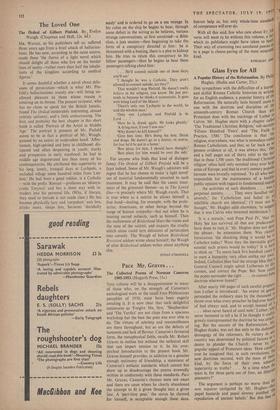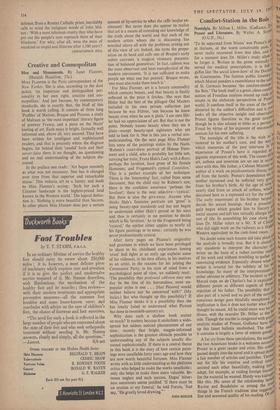Glass Eyes for All
ONE sympathises with the difficulties of a learned and skilful Roman Catholic historian in writinF for an English audience, a popular history of the Reformation. He naturally feels himself more at one with the doctrine and discipline of the sixteenth-century Roman Church than anY Protestant does with the teachings of Luther of Calvin. Mr. Hughes starts with a chapter called 'The Traditional Christian Religion,' sub-sections 'Fifteen Hundred Years' and 'The Faith is Practice, 1500.' The conclusion is that 'the, religion, everywhere, was what is nowadays called Roman Catholicism, and that, so far back as We possess evidence at all, it was always this.' One and a half pages out of thirty refer to the fart that in these 1,500 years 'the traditional Christian religion' often held only nominal sway over large areas of Europe, and that in every century popular heresies were brutally repressed. `To all who were responsible for the maintenance of a healthY public opinion with regard to fundamental morals . . . the activities of such dissidents . was ,a perpetual anxiety. . . . They were handled veil severely,' for 'Catholicism and belief in an infallible church are identical.' CI must not he thought,' Mr. Hughes adds elsewhere, 'to suggest that it was Calvin who invented intolerance.') 'It is a miracle,' said Pope Paul IV, 'that the Holy See has survived all that our predecessor' have done to ruin it.' Mr. Htighes does not deny the abuses: he extenuates them. Was clerical fornication 'the shocking thing it would be to Catholics today? Were they the inevitable grave scandal such priests would be today? It is bard
:,
to think so.' move back five hundred years ", to meet a humanity very often unlike our 0011' Indeed, Catholics then had the strange idea that e General Council might admit Lutherans to dj,s,' cussion, and correct the Pope. But 'how con"' the popes surrender the right . . . to correct false doctrine wherever found?'
After nearly 100 pages of such careful prePar.a: lion Luther is introduced : 'An orator of gents persuaded the ordinary man by the thousand Id, throw over what every preacher he had ever hear.u, of had always said, and to accept instead of 't; . . . ideas never heard of until now.' Luther, Who never hesitated to tell a lie if he thought it useful' grossly misrepresented the doctrine he was attar]'' ! ing. But the success of the Reformation, Mr' Hughes thinks, was not due only to the dishonest v demagogy of the reformers. Its victory in 31':, country was determined by political factors or desire to plunder the Church : never by chit popular appeal of Protestant ideas. 'How coulu:. ever be imagined that, in such revolutions, could` new doctrines succeed, with the mass of m°11; kind, by the force of their own inhereei, superiority as truths? . . . At a time when the mass is, for three parts out of four, an illiterate peasantry?' • The argument is perhaps no worse than the non sequitur castigated by Mr. Hughes—qe papal bastards and papal simony justified 'thsi repudiation of ancient beliefs.' But this line "
defence, from a Roman Catholic priest, inevitably calls to mind the indignant words of John Mil- ton : `With a most inhuman cruelty they who have put out the people's eyes reproach them of their blindness.' For why, after all, were the mass of mankind so stupid and illiterate after 1,500 years?
CHRISTOPHER HILL















































 Previous page
Previous page